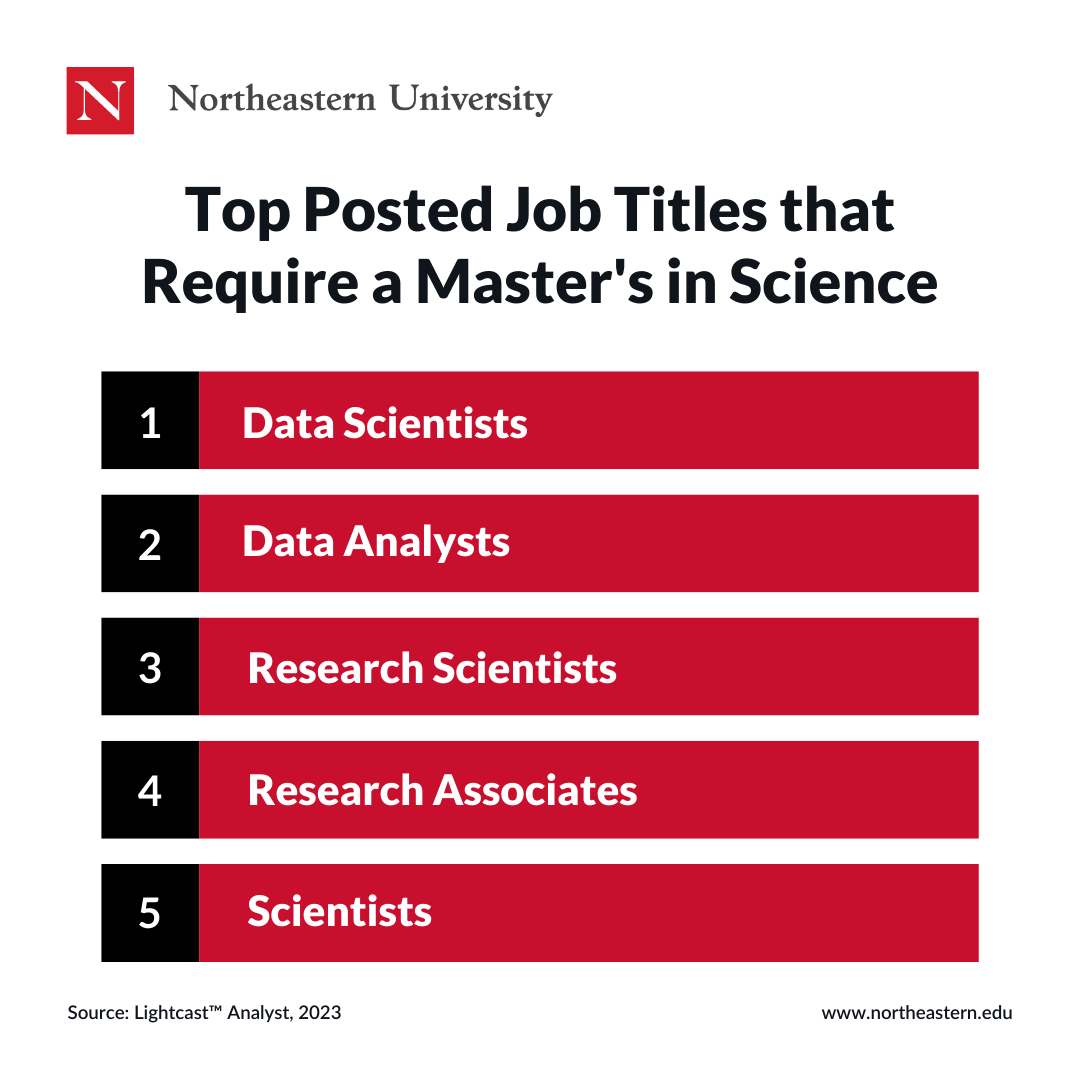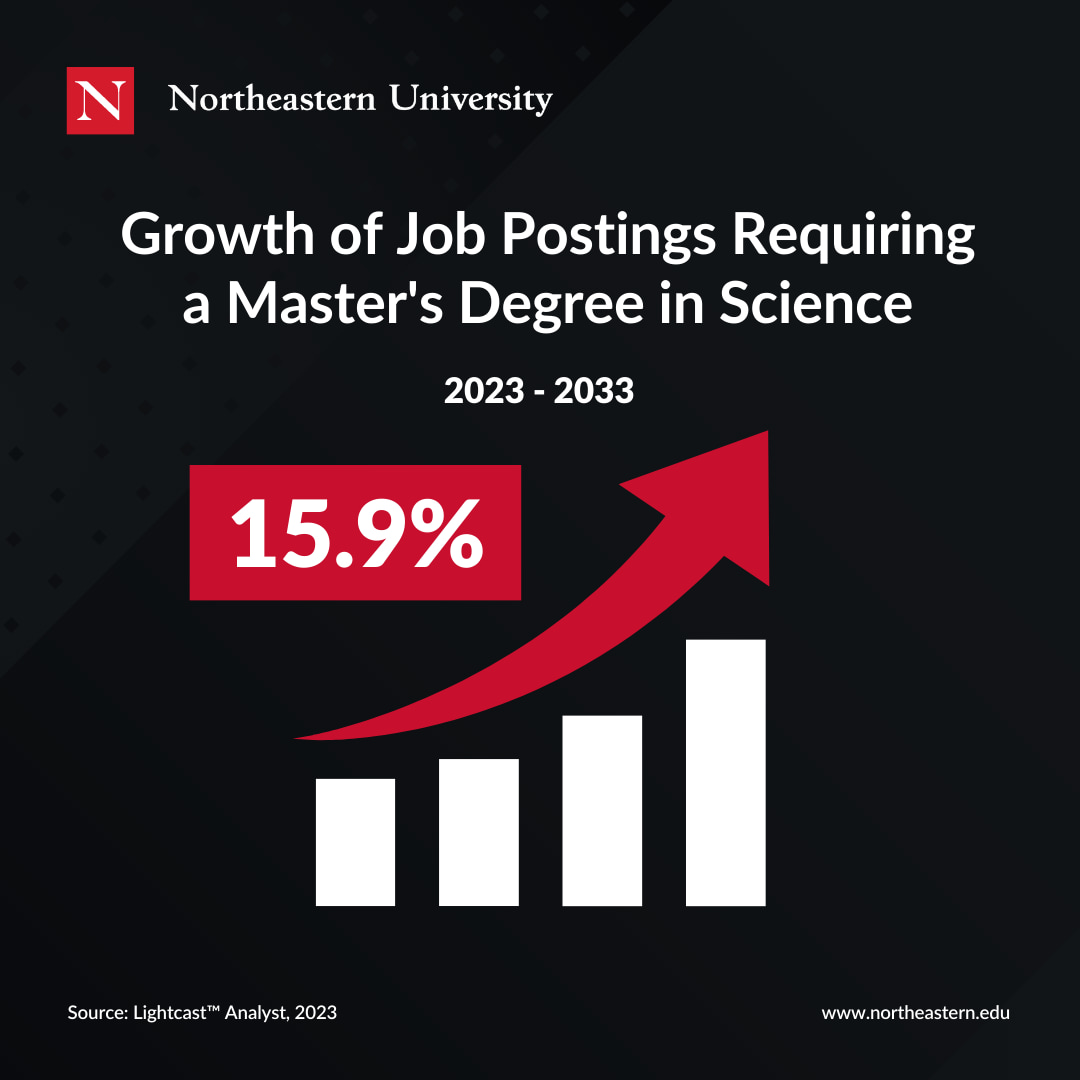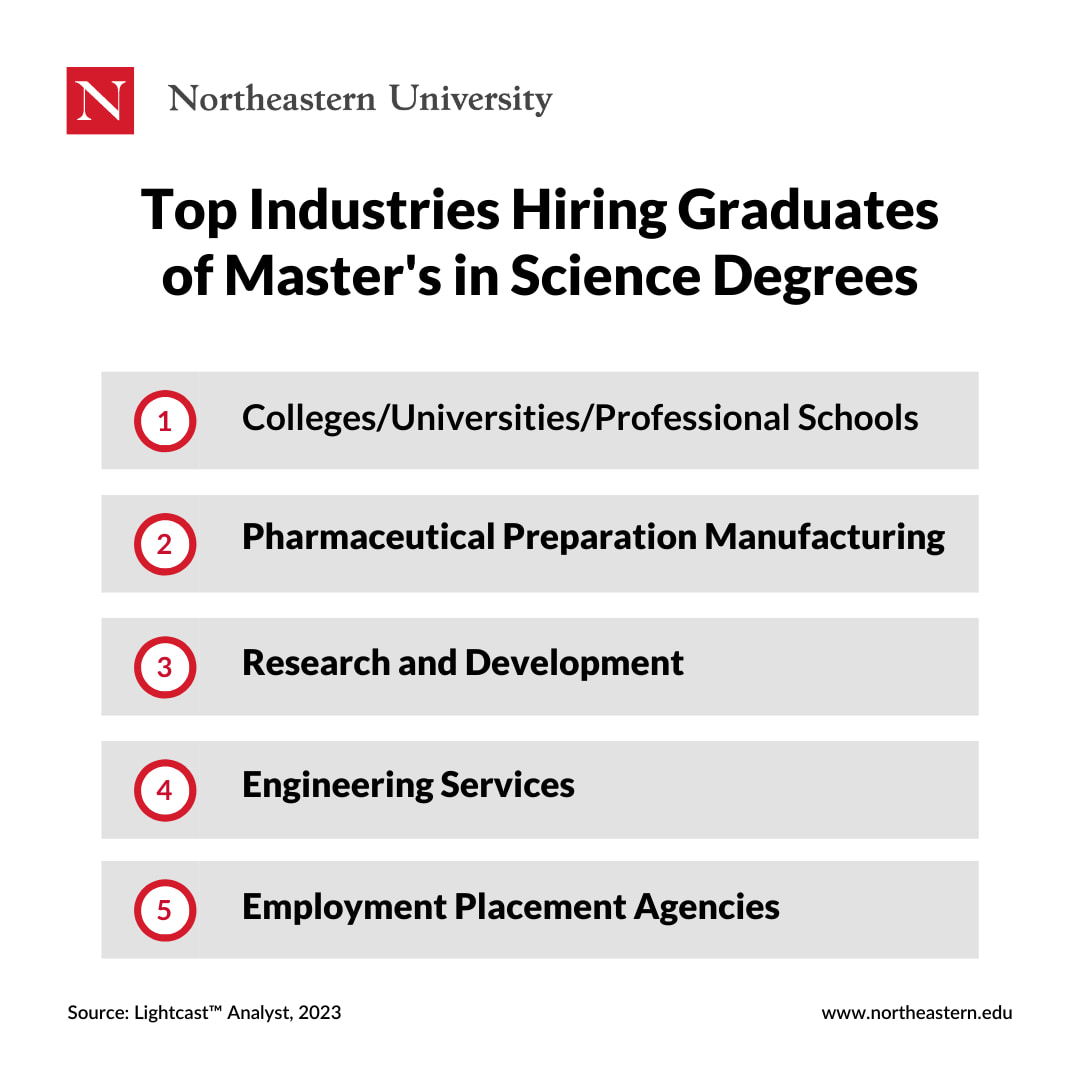In an era defined by scientific discovery and innovation, many aspiring science, math, and engineering professionals are looking for ways to break into these fields. Earning a master’s degree is a common educational path for forward-thinking, innovative, inquisitive minds who have this enthusiasm for applying scientific knowledge to real-world problems.
If you’re wondering if a master’s degree is right for your personal and professional goals, here’s an overview of the degree options in math and science, the benefits you can expect from a graduate-level degree, and how you can jumpstart your career through an institution like Northeastern.
Degree Options in the Sciences
Traditional vs. Applied Degree Programs
Degree options in the sciences encompass a wide range of choices—from traditional science programs like biology, chemistry, and physics to applied science offerings, such as environmental and biomedical sciences.
Traditional science degree programs typically focus on theoretical knowledge and fundamental principles within a specific scientific field. However, applied science degree programs emphasize the practical application of scientific theories to real-world problems. By doing so, students develop the skills needed to bridge the gap between theory and practical application.
One great example of this is the distinction between a master’s degree in mathematics versus applied mathematics.
“Applied mathematics develops data science and quantitative analysis skills that make this program widely applicable—not just in mathematics,” says Dr. Maxim Wolf, associate teaching professor of the MS in Biotechnology program at Northeastern University. “Because applied math isn’t just math. It applies to many careers where math is applicable, which is pretty much everywhere.”
Applied mathematics is just one example of an applied science program though. Northeastern’s College of Science offers a number of applied science programs that can take your scientific knowledge to the next level.
Here are some applied science programs you should consider as an aspiring science professional.
Common Applied Science Degree Programs
- Mathematics: Offers students the opportunity to broaden their knowledge in several fields of mathematics and their applications in business, industry, or government careers.
- Applied Mathematics: The data science concentration in this program provides students with solid knowledge on mathematical modeling, probability, statistics, machine learning, and data analysis, as well as programming skills.
- Operations Research: Trains students in the techniques and theory of operations research and their applications to real-world problems.
- Physics: Touches on advanced research in subjects such as condensed matter, fundamental particles and fields, and biophysics.
- Applied Physics and Engineering: Trains students in one of three electrical and computer engineering concentrations, while also offering fundamental graduate-level physics training.
- Bioinformatics: Provides students with core knowledge in bioinformatics programming, integrating knowledge from the biological, computational, and mathematical disciplines relevant to multiple career paths.
- Biotechnology: Combines advanced interdisciplinary training in various biotechnology concentrations with the development of business skills like stakeholder management.
- Chemistry: Offers diverse courses that touch on topics like clean energy, polymers, materials, medicinal chemistry, bioanalytical chemistry, and chemical biology.
- Environmental Science: Equips students with substantive breadth of knowledge and skills at the intersection of environmental science and policy.
- Marine Biology: Provides students with a strong foundation in marine research, conservation, oceanography, and policy.
- Nanomedicine: Offers hands-on experience in nanomedicine research, innovation, and entrepreneurship.
- Cell and Gene Therapies: Prepares students for the evolving field of cell and gene therapy medicines, providing the knowledge and experience needed for an industrial/research career.
Which Degree Program Is Right for You?
With so many options, it can be difficult to decide which one is right for you. If that’s the case, consider enrolling in an interdisciplinary master’s program.
“Teaching and learning in an interdisciplinary field can be hard,“ says Anne van De Ven, co-director of the MS in Nanomedicine program at Northeastern University. “But our programs are built in such a way that we can take an incredibly diverse group of students and give them the skills and knowledge they need to feel confident in any field—even if it wasn’t the student’s original plan.”
Interdisciplinary doesn’t just mean students are able to apply their knowledge to numerous industries—it also means these programs cultivate important business skills for scientists. Northeastern is one of the institutions that offers this advantage to its students.
“We see lots of interest in programs like nanomedicine,” van De Ven says. “With the latest COVID-19 vaccines, people are starting to recognize the need for this exciting field. And in Boston, employers say they can’t find talent trained in the interdisciplinary techniques they need.”
However, several programs still require some kind of foundational understanding of the topic, which should ultimately drive your decision. For example, according to Dr. Wolf, students interested in bioinformatics should have a foundational understanding of what it is and how it can solve today’s most pressing problems.
4 Benefits You Can Expect With a Master’s Degree in the Sciences
When considering the return on investment (ROI) of a master’s degree in the sciences, there are numerous benefits you can expect from this level of education.
1. Creates a PhD Pathway
A master’s degree is also an excellent educational pathway to a PhD program. This can be highly desirable for prospective science professionals for several reasons.
First, it allows students to establish a strong academic and research foundation before pursuing a PhD. This can be particularly beneficial for students outside of the U.S.
“Many of our international students are trying to find careers or enter PhD programs in the U.S. but don’t feel competitive enough,” van De Ven says. “So they’re looking for that U.S.-based master’s degree to act as a stepping stone.”
Even if students already have an undergraduate degree from a U.S. institution, earning a master’s degree can provide an academic foundation that helps them better understand their advanced educational options.
“I think a master’s can help students know themselves better,” says Sahar Tavakoli, director of the Cell and Gene Therapy programs at Northeastern University. “Are they willing to continue in research or go into an industrial job? That’s very important, because some are not.”
Earning a master’s degree also provides an opportunity to build valuable connections with faculty mentors who can guide you throughout your doctoral program. Creating these relationships can ease the transition into a PhD program and beyond.
Northeastern’s PhD programs take a unique approach to bridging the gap between a master’s degree and a PhD. Since the students and faculty of both programs are so intertwined, graduate students can expect a seamless transition from a master’s program to a PhD.
“I think this helps students build a community beyond just their department,” says Dr. Needa Brown, Co-Director of the MS in Nanomedicine program at Northeastern University. “I don’t know any other programs that are initiating this sort of community building within the PhD programs.”
2. Opens the Door to Exciting Job Opportunities
In addition to increasing salary potential, a master’s degree also opens the door to numerous job opportunities in the sciences. “I think a lot of students really want to know what outcomes they’re going to get from these programs,” van De Ven says. “How is it going to advance my career?”
According to our analysis of job posting data related to science job titles, nearly 30 percent of employers required a master’s degree in 2022. As a result, pursuing advanced education in your field of choice is becoming more and more important to secure employment.
While there are numerous career paths you can pursue in science, our analysis shows that some of the top job titles of professionals with a master’s degree from a science program are:
- Data Scientists: Use statistical analysis, programming, and domain expertise to extract valuable insights from complex datasets, enabling data-driven decision-making
- Data Analysts: Examine, interpret, and transform data into meaningful information to aid organizations in solving specific business problems
- Research Scientists: Conduct systematic experiments and studies to expand knowledge and contribute to advancements in their field of expertise
- Research Associates: Junior-level researchers who collaborate with senior scientists in academic, corporate, or institutional research projects
- Scientists: Apply the scientific method to gain a deeper understanding of the world and contribute to the accumulation of knowledge in their respective field of expertise

Whether you’re interested in these specific careers or another professional path, earning a master’s degree gives you the credentials needed to gain employment in a thriving business sector. In fact, according to our analysis, U.S. employment in science is projected to grow by nearly 16 percent by 2033.

“With a master’s degree, students can find a job easier than someone who’s graduating with a bachelor’s or international applicants who want to work in the U.S.,” Tavakoli says. “So this degree can create a very smooth transition, helping them gain professional information, scientific knowledge, and the right skill to find a job.”
3. Increases Earning Potential
Like most advanced degrees, earning a master’s degree in science can reap substantial financial benefits. This is largely because earning a master’s degree in the sciences shows a commitment to the field and allows you to gain experience needed to stand out to employers.
According to our analysis of job postings data, the median advertised salary of professionals with a master’s degree in the sciences is $98,700—with a large percentage of science professionals earning over $100,000.

There’s also been a significant spike in the average earning potential for science-related job titles over the past five years. In fact, according to the same job postings report, the median annual salary of science professionals with a master’s degree increased by over 40 percent from 2020 to 2023.
This ensures any investment in advanced education leads to not only a return on investment, but also long-term financial stability.
4. Provides Industry Experience Opportunities
One of the most notable benefits of enrolling in a master’s degree program in the sciences is the industry experience it provides students. For programs, like the ones offered at Northeastern, this is achieved through co-ops.
“Developing or using practical experience helps students engage, gain more interest, and identify a direction,” Dr. Wolf says. “Regardless of which field or program a student chooses within the college of science, experience is useful for future career outcomes.”
These co-op experiences offer numerous opportunities to learn in a real-world setting in a variety of industries. With the guidance of industry experts, students can feel more confident entering their field of choice post graduation.
According to our analysis of job postings data, some of the top industries that employ science professionals with a master’s degree include:
- Colleges/Universities/Professional schools
- Pharmaceutical preparation manufacturing
- Research and development
- Engineering services
- Employment placement agencies

Completing a co-op in one of these industries is just one way to garner the industry experience needed to succeed in the sciences. Another method is through in-class projects that leverage real-world data. At Northeastern this is called experiential learning.
“When we think about experiential learning, it’s not just taking two years of courses and a co-op at the end,” van De Ven says. “It’s really about including signature learning projects within our courses. So there’s always a chance to apply the things you’re learning as you’re learning them.”
Advance Your Education in the Sciences
A master’s degree can provide an immersive and specialized educational experience that allows you to dive deeper into your chosen field of study.
“We’re really looking for students who are excited about the field,” Dr. Brown says. “We want to do more than provide knowledge, we want to teach them how to apply that knowledge to solving real-world problems.”
Northeastern University’s College of Science offers interdisciplinary programs that leverage experiential learning. “Experiential learning is built into the curriculum with individual courses to widen students’ experiences and knowledge throughout the program,” Tavakoli says.
If this interests you, consider checking out the various degree options available at Northeastern. No matter which program you choose, you’ll be empowered to become a confident, entrepreneurial problem-solver with a flexible skill set for an exciting career in the sciences.






Related Articles
Compliance Specialists: Who They Are and What They Earn
Science or Science Fiction? The Future of Personalized Medicine
In-Demand Biotechnology Careers Shaping Our Future